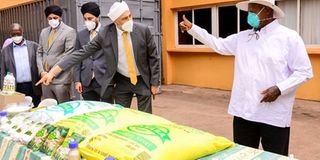Kinyara mill stuck with 5,000 tonnes of sugar

About a year ago, President Museveni commissioned Kinyara white sugar manufacturing plant. However, Kinyara says it is stuck with the sugar due to low demand. Photo/file
What you need to know:
The factory management has expressed concerns about the surplus sugar and the challenges it poses, calling on the government to intervene.
The Kinyara Industrial White Sugar Refinery, commissioned in February 2022 with a daily production capacity of 250 to 270 metric tonnes, now finds itself in dire straits as it grapples with a stockpile of 5,000 metric tonnes of white industrial sugar.
Factory management has called on the government to intervene and address the situation.
Mr Aldon Walukamba, the communication manager of the factory, said the local market was flooded with imported white sugar, causing a slump in demand for the factory’s products.
“The reason why we have all this stockpile is that we lack a market locally due to the importation of white sugar in the country,” Mr Walukamba said.
In an attempt to mitigate the situation, the factory had previously been exporting its white sugar to various countries, including South Africa, Belgium, Kenya, and South Sudan.
However, even the international market witnessed a decrease in demand for white industrial sugar, adding to the factory’s predicament.
During the factory’s commissioning in February last year, President Museveni highlighted the importance of boosting domestic production to reduce the country’s dependence on imported refined sugar.
He emphasised that Uganda had been losing $50 million (about Shs181 billion) annually due to imports, which could be replaced by locally produced sugar.
President Museveni was optimistic that with increased production, Uganda’s refined sugar could find a ready market both domestically and throughout East Africa, where the demand for industrial sugar stood at 150,000 metric tonnes.
He also mentioned the possibility of negotiating with neighbouring East African countries to purchase Uganda’s industrial sugar and the implementation of import duty taxes on foreign white sugar to discourage excessive imports.
In response to the crisis, Kinyara sugar factory last week engaged a six-member committee from the Ministry of Finance during their recent tour of the facility.
The committee was apprised of the issue of stockpiled white industrial sugar, and they promised to escalate it to higher authorities in the Ministry of Finance for swift consideration.
Recognising the urgency of government intervention, Mr Walukamba expressed hope that authorities would take prompt action.
To protect the domestic sugar industry from further harm and support its growth, the management of Kinyara sugar factory has appealed to the government to implement an import duty tax on foreign white sugar.
This move aims to discourage excessive imports that are currently flooding the market and suppressing the demand for locally produced sugar.
Industrial sugar plays a vital role in the production of various products, including soft drinks, baked goods, confectioneries, and pharmaceuticals.
Effect
The entire sugar industry in Uganda awaits the government’s decision, as the fate of Kinyara sugar factory and its 5,000 metric tonnes of stockpiled sugar hangs in the balance.
Failure to address the crisis could lead to financial losses for the factory, potentially affecting its employees and the overall economy.




